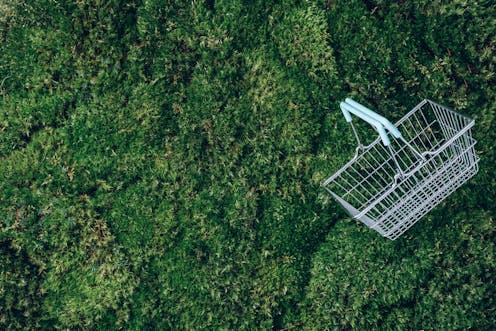Individual action on climate was tarred as greenwashing or virtue signalling. But it still has a place
- Written by Sukhbir Sandhu, Associate Professor in Sustainability, University of South Australia

Two decades ago, the fight against climate change was often framed as a personal choice. You might try to reduce your carbon footprint by avoiding flights or change your buying habits to avoid meat or reduce plastic.
But this approach lost popularity, as it shifted responsibility from producer to consumer. The carbon footprint, for instance, was famously popularised by oil company BP. In 2008, well-known American climate activist Bill McKibben pointed out the impotence of individual action without collective action.
Behavioural researchers also began finding a seeming paradox – many of us expressed strong interest in taking individual action on climate, but our actual behaviours barely changed.
Much focus shifted to top-down efforts such as government incentives for clean energy and commitments at a national level to cut emissions.
But there is still a role for individuals – especially around demonstrating what clean alternatives actually look like. For instance, the more solar panels are installed on rooftops in your neighbourhood, the more likely you are to consider it. This neighbourhood effect also affects uptake of electric vehicles and e-bikes. This is especially important if we are to see clean alternatives go mainstream rather than stop at a small fraction of the population.
Of course, individual actions can only go so far. As our research on sustainable consumption has shown, individual actions can be magnified with a backdrop of institutional support.
What we say and what we do
Humans are complicated. We often say we want to make greener choices – but in reality, we act differently.
Individual climate action sounds great in theory. If many of us chose electric vehicles or bikes, installed solar panels and built energy efficient houses, our actions in aggregate could contribute to wider emissions goals. Then there are choices such as reducing dairy and meat, installing LED lights and buying produce with less packaging.
Everyday actions can contribute too, such as washing clothes in cold water, avoiding putting aircon too low or heating too high, and wearing extra layers of clothes. Recycling, repairing and reusing offer us still more methods to extend the life of our products, reduce waste and save money.
Yet it turns out the reality of individual action on climate is much more complicated – because we are complicated.
When surveyed, a majority of us say we want green, sustainable products. But when we go to the shops, we often don’t actually buy them. My colleagues and I have dubbed this the “Janus faced” consumer phenomenon – we often say one thing but do another.
Why might that be? One reason is many consumers believe green products – whether electric cars or detergents – will perform worse. Green products are also perceived to be more expensive and inconvenient to use.
Then there’s the question of virtue signalling. This is a phenomenon where consumers purchase highly visible green products primarily to signal they’re a person who cares about the environment without necessarily doing so.
Some of these challenges are being overcome. It’s hard to write off modern electric cars as inferior when they can accelerate faster and run much cheaper than fossil fuel cars. While early adopters of solar might once have been seen as virtue-signallers, the main reason Australian households go solar is to save money on the power bill, according to a CSIRO survey.
One and the many
Individual action can only go so far. For individual action to create sustained impact, it needs supportive policies and institutional backing.
For instance, a 2023 report found many Australian clean energy organisations would like to re-use solar panels for community projects or as a low-cost option for households. This makes sense, given used solar panels are often 80% as good as new ones.
But for consumers to actually act on this, they need institutional scaffolding. If you’re going to buy used solar, you want to make sure they are in good condition. Without a certification process, their willingness will come to nothing.
While many of us say we would consider buying an electric vehicle, the uptake is constrained by things outside our control such as whether there are enough public chargers in cities and rural areas.
You can see the importance of institutional backing clearly in transport. The Melbourne-Sydney flight path is the fifth busiest in the world. That’s because there are no fast green alternatives. If there was high-speed rail as in China or Japan, many of us would choose to avoid the emissions caused by flying. But it doesn’t exist (yet), so our individual choices are curtailed.
Which way forward?
As climate change intensifies, more and more of us say we are willing to act on our beliefs and concerns on an individual level. Even better, more of us are actually doing what we say we will.
Not everywhere, of course. For many Australians, switching from petrol to electric might be easier than giving up meat or a flight to Japan. But some progress is better than none.
This groundswell is encouraging. But our individual efforts can only go so far. To make the most of it, we need institutional scaffolding. Australia has world-beating rooftop solar uptake because state and federal governments used subsidies and incentives to make the emerging technology cheaper. With incentives on offer, millions of us made individual choices to take it up.
We are more than consumers, of course. Our power as individuals isn’t limited to choosing specific products. As citizens, we can push for our governments to provide the essential scaffolding we need to make greener choices.
Authors: Sukhbir Sandhu, Associate Professor in Sustainability, University of South Australia



















